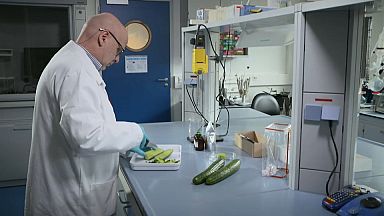The European Commission Joint Research Centre (JRC) is developing Certified Reference Materials (a “CRM”) to check pesticides in foods. A CRM is a measurement standard supporting laboratories to check the quality of their measurement methods.
The European Commission Joint Research Centre (JRC) is developing Certified Reference Materials (“CRM”). CRM is a measurement standard supporting laboratories to check the quality of their measurement methods.
CRMs are being developed at the European Commission Joint Research Centre (JRC) in Geel, Belgium. The labs are performing quality checks to monitor ingredients and contaminants in the food, such as the pesticides in cucumber. They have even developed a 'pesticides in cucumber' CRM. Its powder made from cucumbers that comes with a certificate indicating the concentration of multi-pesticides. Euronews spoke to Marta Dabrio a project Officer at JRC-Geel about the CRM.
"Laboratories can use our cucumber CRM by integrating it into their own measurements. This means that if they analyze the CRM with their own methods, and if they obtain the results that we indicate in the certificate, they measure correctly."
But they also analyse real food products. The cucumber needs to be prepared. If the number of pesticides analyzed in the cucumber CRM match those in the certificate, it confirms that the analytical method and the instruments used by the laboratory are reliable.
This gives laboratories accurate results to insert into the EU pesticides database and helps the European Food Safety Authority (EFSA) to assess the risks.
The use of CRMs ensures a common measurement system in the EU. This helps in monitoring the implementation of legislative requirements, such as maximum limits. This year again, more than a dozen new materials will be processed and certified by the JRC.












